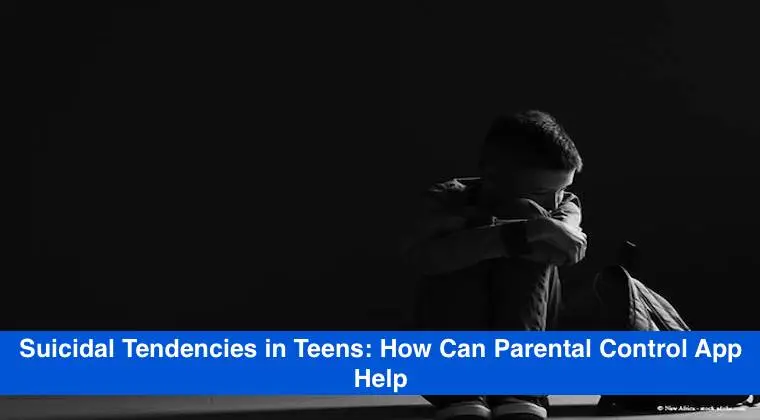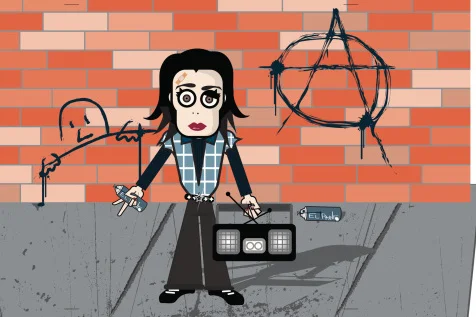+1 845 259 2974 (11 a.m to 7 p.m CST)
Suicidal Tendencies in Teens: How Can Parental Control App Help?

The adolescent years can be an emotionally tumultuous time, and the rise of mental health issues among teenagers remains a pressing concern. Among these concerns, detecting suicidal tendencies is crucial, as early intervention can save lives. It is hard for the parents to think about their kids having suicidal thoughts, they can’t even think about taking the next step which is for their betterment.
While teen years are tough ones, parents also tend to neglect a lot about what is going on with their kids. Apparently, kids might show that they are the happiest on planet, and they don’t need any help. But it might not be true at all. Parents need to step up and see what is going on with their kids’ lives because this is where it all gets neglected, and kids end up doing something horrible. Suicidal tendencies are very common in kids these days and that is why parents need to focus on them.
In an era dominated by technology, parental controls offer one tool for parents to help monitor and support their teenagers. Yes, a good parental control app can help you identify the issue and help your kids do better with their lives.
Signs and Symptoms of Suicidal Tendencies in Teens
First, you need to know how you can identify what is going on with your kid. There are a lot of minor signs that can show that something is terribly wrong. Parents usually ignore these signs, but if you could focus on these things, you can save your kids’ lives. Here are some of the most prominent signs:
- Verbal Expressions: These can range from direct statements like "I want to die" or "I don't want to be here anymore" to more subtle comments like "You'd be better off without me" or "I feel trapped."
- Change in Behavior and Mood: This includes withdrawal from friends and family, loss of interest in activities, decline in academic performance, or sudden outbursts of anger.
- Increased Risk-Taking: This can manifest as reckless driving, increased use of drugs or alcohol, or any behavior that indicates a disregard for personal safety.
- Giving Away Possessions: Teens might give away cherished belongings or suddenly make a will.
- Preoccupation with Death: This can manifest in artistic or written expressions, or an excessive interest in topics of death or violence.
Rather than keeping them isolated because they are like this, note these things and do something for their betterment.
Cause of Suicidal Thoughts in Teens
The causes of suicidal thoughts in teenagers are multifaceted, involving a combination of individual, relational, community, and societal factors. While it's essential to remember that every teen's situation and emotional makeup is unique, here are some common triggers and potential causes for suicidal ideation in adolescents:
- Mental Health Disorders: Many teens who experience suicidal thoughts suffer from one or more mental health disorders, such as depression, anxiety, borderline personality disorder, or post-traumatic stress disorder.
- Substance Use and Abuse: Drugs and alcohol can exacerbate feelings of hopelessness and despair, impair judgment, and increase impulsivity, leading to heightened risk of suicidal ideation.
- Peer Pressure: The constant need to fit in or live up to societal expectations can put enormous stress on some teenagers.
- Bullying: Both victims and perpetrators of bullying are at an increased risk of suicidal thoughts, plans, and attempts.
- Traumatic Events: Events like physical or sexual abuse, the death of a loved one, or exposure to another person's suicide can trigger suicidal thoughts.
- Chronic Illness or Disability: Facing the challenges of a chronic illness or disability can lead to feelings of despair or depression in teens.
- Family History: Teens with a family history of suicide or suicidal tendencies might be at an increased risk.
- Feelings of Isolation: The feeling of being alienated or misunderstood, even if it's just a perception, can contribute significantly to suicidal ideation.
- Romantic Relationship Issues: Breakups, conflicts, or feeling because one's sexual orientation can cause intense emotional pain for teens.
- Academic Pressure: The stress of failing grades or fear of not living up to academic expectations can be overwhelming for some teenagers.
- Access to Lethal Means: Having access to things like firearms, pills, or other means can increase the risk of suicide.
- Media Exposure: Overexposure to graphic news stories, movies, or songs about suicide might contribute to suicidal ideation in some teens.
- Financial Stress in the Family: Economic hardships and instability can add an extra layer of stress to a teenager's life.
- Lack of Access to Care: Many teens do not have sufficient access to mental health resources, which can exacerbate feelings of hopelessness.
It's crucial for parents, caregivers, educators, and peers to be vigilant and understanding, ensuring that they provide necessary support and intervention when needed. If a teen exhibits signs of suicidal ideation, it's important to seek professional help immediately.
How A Parental Control App Can Help
Using a parental control app might come as a surprise for some parents, but it is the correct approach, and it can help you in sorting your kids’ teen years. Here are some of the things that can be done with the help of a parental control app:
- Monitor Online Activity: The internet, especially social media platforms, can be a space where teenagers express their feelings more openly than they might face-to-face. Parental controls can help parents monitor for any concerning search queries, messages, or posts that might suggest their teen is struggling.
- Restrict Access to Harmful Content: The web, while a vast resource, also contains harmful content. Parental controls can limit access to websites or content that glorifies self-harm, suicide, or offers methods for committing suicide.
- Limit Screen Time: Excessive screen time can exacerbate feelings of isolation. Setting boundaries on how much time a teen spends online, especially before bedtime, can improve sleep patterns and overall mental health.
- Set Geofencing Alerts: Certain parental control tools allow for geofencing, which alerts parents if their teen visits a specific location, such as a known hotspot for suicide or an unfamiliar place at odd hours.
- Encourage Open Communication: Using parental controls should come with a clear line of communication. Let your teens know that the goal is to ensure their safety and mental well-being, not to invade their privacy. This can foster trust and make teens more likely to open about their feelings.
A parental control app is not a standalone solution to the issue of teen suicide. They are one tool in a broader approach that should include open communication, involvement in your teen's life, awareness of their struggles, and prompt professional intervention when required.
If you ever suspect your teenager might be contemplating suicide, it's essential to take it seriously and seek professional help immediately.
Remember that while technology provides tools to assist, human connection remains invaluable. Building a strong, trusting relationship with your teen ensures they know they have someone to turn to when they're in crisis.


















